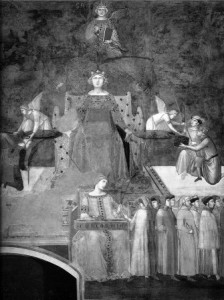HUMAN RIGHTS COLUMN: Time, Justice, and Death
Time and justice are inseparable: it is impossible to do justice without a proper awareness of time. Time does not only pass for the dead; it also passes for the living—the living who are waiting, at the side of the graves, for the return of their family members’ remains. They are waiting for a door to open. In Spain, that door remains closed.
The headline may sound tragic. But whether we like it or not, the three words go well together. And the only one we really know about is the third: death.
Attempts to define time and justice, on the other hand, have produced rivers of ink from philosophers and jurists alike. Time and justice are abysmally profound, and so closely intertwined they are inseparable.
Let’s not forget Ambrogio Lorenzetti’s Allegory of Good Government in the Town Hall of Siena, Italy, where Justice, the wisdom of law, is seated next to Temperance, the wisdom of time. It is impossible to do justice without a proper awareness of time.
How does this relation reveal itself through specific facts, in specific countries? Let’s consider the unopened mass graves in the Spanish State: the hundreds, thousands of people who were thrown into those graves and the time that passes over those graves and over those people. Time does not only pass for the dead; it also passes for the living—the living who are waiting, at the side of the graves, for the return of their family members’ remains.
Time goes by for both, for those beneath the earth and those above it. They are waiting at the same time for a door to open, a door that in turn will allow the earth to open and to draw those beneath it to the surface. In Spain, that door remains closed. Those who have the power to open it, what are they waiting for? Why aren’t they allowing the living to unbury their dead and bury them as the living have always buried their dead?
Why aren’t they allowing the living to unbury their dead and bury them as the living have always buried their dead?
Time passes for both. But it passes much more relentlessly for the living than for the dead. Slowly but surely the living are falling, dying without having fulfilled their mission: unburying and burying their loved ones. As the living become the dead, so too are the only voices that spoke up in the name of the initial dead—those who did not succumb to the passage of time but to the bullets and knives of their murderers.
Behind the door that should be opened to allow for the living to rejoin the dead, is Justice. Justice, who ignores time, whose blindfolded eyes do not see how time passes and destroys. Who uses her blindfold as an excuse to not open the door that would conquer time. And yet, Justice awaits… What is she waiting for? For time to pass, for her to turn, almost without anyone noticing, into her more proper possibility: Injustice.
Justice turns into Injustice when she doesn’t take into account death: the relation between time and death, the fact that human beings are finite.
Justice turns into Injustice when she doesn’t take into account death: the relation between time and death, the fact that human beings are finite.
It is not the dead who call for justice, but the living, who will also soon be dead. On the one hand, Justice seems to transcend death, as if it thought human beings were eternal, and that we can wait indefinitely. On the other hand, she seems to speculate on death: “one day they’ll die and stop calling for me.”
When this occurs, we have a system of law that, instead of administering justice, administers injustice. A system of law that decides when it is too late, that denies access to justice when there is barely any time left to demand that access. A system of law that knows more about keeping doors shut than about opening them, more about half-opened mass graves than about proper burials. A system of law that, instead of conquering time, patiently waits for it to pass until death catches up with the living, so that they will never be able to reunite with their dead. Not even in death.
It’s a powerful Law, this one which goes beyond life so that everything may be death. It’s a weak Justice, this one which allows time to turn it into Injustice. It’s a powerful Time, this one that conquers Justice and brings us Death.
It is not the dead who call for justice, but the living, who will also soon be dead.
This is a reflection on the horror that Spain is living today. A horror that doesn’t stop, and gets worse as time passes. Thousands upon thousands upon thousands of people thrown or buried wherever, who are not returned to their families, not even when they’re nothing but a handful of bones.
We don’t know where our dead are.
They want us to continue walking, when we don’t even know on whom it is that we are walking.
Ana Messuti holds a law degree from the University of Buenos Aires, earned her doctorate in Salamanca, Spain, and has worked for the United Nations. She is working on behalf of the victims of Francoism in the case before the Argentine courts. Among her books is Time as Punishment (2008).
Translation: Sebastiaan Faber














